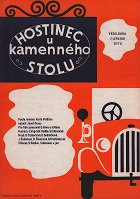Directed by:
Josef GrussScreenplay:
Otakar VávraCinematography:
Julius VegrichtComposer:
Sláva Eman NováčekCast:
Dagmar Frýbortová, Dagmar Sedláčková, Jiřina Šejbalová, Růžena Šlemrová, Svatopluk Beneš, Rudolf Hrušínský, Josef Chvalina, Stanislav Neumann (more)Plots(1)
Same as every year, the family of the official Dyndera come to have their holiday in the small spa resort Džbery, and, as usual, they stay in the At the Stone Table inn. Spytihněv and Tomáš, the nephews of the Tatrmuž married couple who are the owners of the inn, come to stay with them for the holiday. They haven't spoken to each other since they quarreled about a glass marble as little boys. From the moment of their arrival, Spytihněv and Tomáš are fascinated by Dyndera's daughters, Věra and Alena, and they start to flirt with them. A promising start to the holiday idyll is disturbed by the owner's wife Božena running off with Beno Mertens, an actor from the travelling company. Unhappy Tatrmuž shuts himself inside his room and the nephews have to take over the running of the business, changing places as manager and head waiter each week. The inn is not quite flourishing under their management. The Dyndera family can't stand seeing Tatrmuž's grief and the bankruptcy of the company so they decide to act. The energetic wife of the official finds the innkeeper's wife and persuades her to come back. A few remaining guests welcome Božena back warmly, Tatrmuž forgives his wife, and the nephews can devote themselves to their girls, who manage to reconcile the two young men. (official distributor synopsis)
(more)Reviews (3)
This film has a special spot in Czechoslovak cinematography. It is the last film of its kind. Although it was created under the new regime, its screenplay and preparation were part of the pre-February era. It has become a symbolic end to the pre-war world with typical characters of petty-bourgeois businesspeople, tradesmen, middle-class ladies, and gentlemen and ladies. In the films that followed, socialism was already being established and class enemies were being attacked, the decadent genres were disappearing, and inspiration was being sought in the East and especially in the so-called socialist realism. The film has a pleasant and tried-and-tested cast, with stars like Saša Rašilov, Stanislav Neumann, Jiřina Šejbalová, and many others delivering exactly what the audience expects and what they do so well. In addition, the film is based on a quality literary source by Karel Poláček. Overall, it's a likable comedy that captures the spirit of the First Republic better than financially deprived pre-war slapdash films. Overall impression: 75%.
()
The combination of Poláček, Vávra, and Gruss is simply not ideal to remind me of the classic era of Czechoslovak cinema. However, in 1948 the Czechs were already in the third year of working in the state, and with each passing year, it only got worse. Moreover, this is situated in a strange timelessness, where the alleged year 1925 is associated in places with the pure present, and at other times with the forgotten times of the Austro-Hungarian monarchy. The interplay between Hrušínský and Beneš has its better moments, but it is desperately drowned in the completely uncoordinated surroundings, and the film doesn’t know whether it is a comedy, a drama, or perhaps a tragedy.
()
Old Czech comedies are simply beautiful and they show how tender and lovely sense of humor we had back then. Unfortunately, that no longer applies in present time. Mr. Hrušínský and Beneš are irresistible in the roles of brothers, partly due to the situations they find themselves in. Entertaining, adorable, but also imaginative and original.
()

